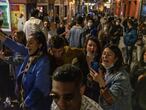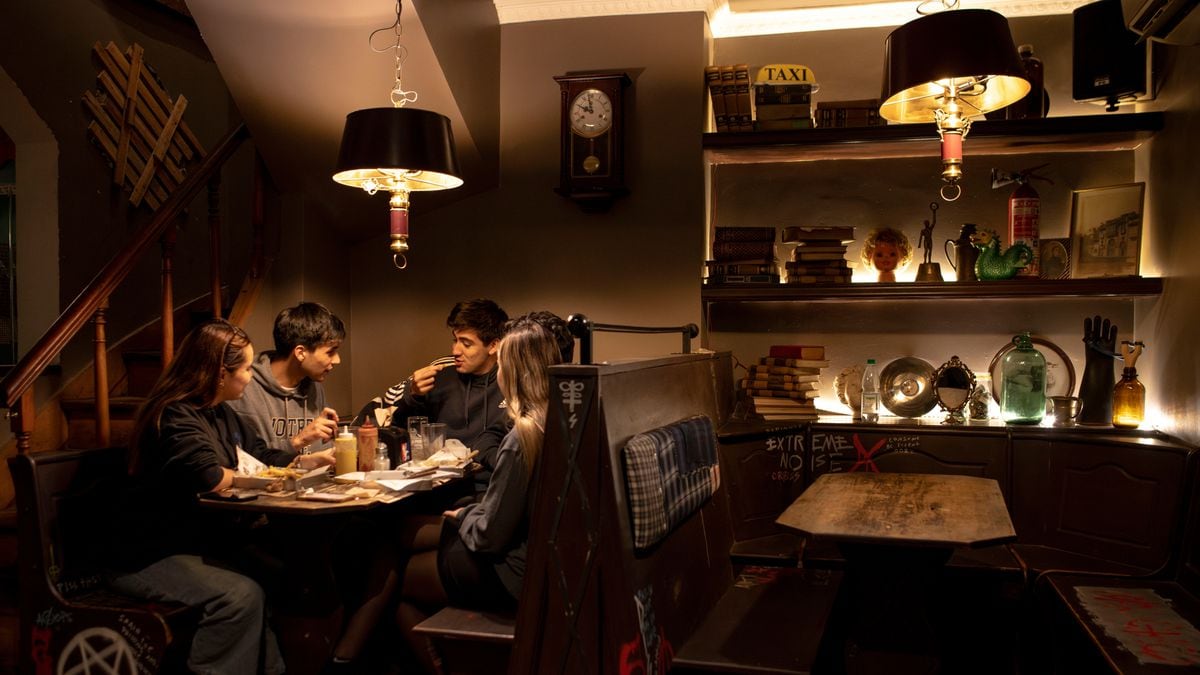"The party is still at home, like every weekend."
It's Friday night in Madrid's Puerta del Sol. Three young people carry bags containing bottles of rum.
They walk in a hurry.
It is eleven o'clock, the time that marks the curfew and the closing of the bars in the Community of Madrid.
The street, however, does not smell like a curfew.
There are huddles and crowds of those who leave the premises still wanting.
Plastic cups, cigarettes, chants and hugs abound.
Masks are in short supply.
One more weekend, young people partying in Madrid leave images that belong to a world prior to the pandemic.
Images that coincide with a video published this Friday on Twitter by the president of the Community of Madrid, Isabel Díaz Ayuso, in which several hoteliers from well-known bars and restaurants in the Madrid capital proclaim that “Madrid is freedom” and “We are more alive never".
The incidence of the community with the most lax restrictions on nightlife has been growing since last week and already reaches 241.12 cases per 100,000 inhabitants.
And when the authorized leisure ends, the clandestine begins.
After eleven o'clock, the question that floats on the post-curfew sidewalk is "and now where do we go?"
Photogallery: Young people after the curfew, in Madrid
New crowds in the streets of central Madrid after the curfew
Roberto organizes a weekly bottle at his home in the Salamanca district.
This thirty-something, who keeps thousands of euros in a safe with which he could face the possible fine, considers charging the entrance to his events.
“There are Saturdays that many foreigners come, friends of friends.
It could be a business ”.
About thirty young people without masks crowd in the attic of the luxurious building and almost all of them smoke.
Music blasts out loud amid shouts, dancing, and colored lights coming out of a miniature sphere attached to the wall.
"Shhhhhh" is heard every time the doorbell rings.
The atmosphere oscillates between euphoria and fear that the police will break in.
When there is a knock on the door, the guests stop talking and the organizer watches through the peephole to check that everything is in order.
"Neighbors can report and your hair falls out," he says.
But most of the rings are from his friends, who come from the apartment across the street, where they are also partying.
They even have a password to access the apartment: “avocado”.
Illegal party last Friday in a flat in the Salamanca district of Madrid.
Lf
The capital of Spain is, in the midst of a pandemic, an oasis for parties.
Only in the 11 weekends of 2021, the Municipal Police has dismantled 3,761 in homes and premises in which the restrictions were not met, according to sources from the Security and Emergencies area of the Consistory, but the authorities know that this figure is only the tip of the iceberg.
Madrid is not the only Spanish city where illegal parties abound.
In Valencia, between March 2 and 20, a traditional holiday period due to the Fallas, 214 sanctions were imposed for noise in homes.
In Barcelona, the Guardia Urbana considers interventions at private parties "anecdotal".
In November, due to the increase in meetings in the street, a specific unit was created that has since filed 1,709 complaints for violation of municipal ordinances, most of which had to do with the practice of drinking bottles.
The difference between these cities and Madrid is that in the capital the bars and restaurants remain open until 11pm, coinciding with the capital curfew, while in Barcelona or Valencia, the hotel business closes between five and six in the afternoon and the curfew begins at 22.00.
In other words, the streets of Madrid, with more lax prohibitions, become every night, especially on weekends, a refuge for foreigners and natives.
Dozens of people partying on a street in the center of Madrid, this Friday night.
Video provided by Juanma Samusenko
In Roberto's airtight apartment, with the windows and the door closed so that the noise doesn't give them away, Martina celebrates her 23rd birthday.
"I know this is wrong to do, but I can't stand being home."
The young woman is "desperate" to find a job.
"These parties give me life," he says while dancing in the room.
His friend Iván, of the same age, serves him a drink while lamenting the vital horizon of the young people.
"Half of my group is unemployed and depressed, so we get together at homes to forget about our problems a bit."
The television acts as loudspeakers and the command with which the decibels are controlled runs from hand to hand.
Juan, 22, lives just downstairs, but the loud music, noise, and hustle and bustle of people going up and down don't worry him.
The building is paradise for pandemic parties, since almost all the floors are offices and offices with no activity on weekends.
This finance student is not afraid of the virus and does not miss a Saturday.
"I work 16 hours a day, of course I'm going to party," he justifies as he lights the umpteenth cigarette and refills his glass of
gin and tonic
, which he shares with everyone.
"I have negative PCR from Wednesday," he jokes.
"I'm only good for parties, man," says Lorenzo, 28, who lost his job in a warehouse a month ago.
"I am not a denier, I passed the virus in March ..., but now I have decided not to live in fear," he says.
"I am more afraid that society does not take into account that they are taking away our freedom."
The freedom to enjoy is also the argument of Marta, 26 years old: "I have had to endure insults from people who are manipulated by the official discourse, they do not understand that we are wasting the best years of our youth."
Irene, 25, is "aware" that parties, like the one she is in, "are illegal and wrong", but in return, she says while pouring another glass of gin, she has not seen her parents in more one year.
Several participants in an illegal party, last Friday, in the Salamanca district of Madrid.
LF
Jon walks into the party with his laptop.
Before the pandemic, he made a living by DJing.
He has been to clubs in Mexico, Colombia or Germany.
Now he does it at illegal parties in Madrid while the crisis passes.
On the street, everything is silent except when someone arrives and, when they are on the wrong building, knocks on the front door phone.
A man in pajamas complains through the window.
"Get out of here shitting, the police are coming," he grumbled.
"Every weekend it's the same story."
After metal clasp
Valentina, a 25-year-old Panamanian, studies a master's degree at the EAE business school in Madrid, and goes out to party every weekend.
This Friday she decides to do it for Chueca with her friends and a public relations person invites them to have a shot.
It is the excuse to take them to an apparently closed place.
A security guard lifts the metal clasp for a few seconds.
The place is packed and the speakers shake as the attendees dance.
"Going out is forbidden.
If you want to smoke, inside ”, explains the waiter.
"The place has no ventilation, but you dance well," says Valentina.
To leave they ask for an Uber.
Before letting them out, the guard makes sure that no one is there.
In the Malasaña neighborhood, also in the center of the capital, the owner of a small bar recommends to his clients places where they can go after curfew: “Get to Ballesta street and at the black gate press the number one, they will ask you for the password.
You tell them that a hotelier in the neighborhood has recommended it to you ”.
The
techno
sound
penetrates the walls and the shouts of the party can be heard in the street.
However, the only ones left out are the prostitutes who work in that area.
"There are several places here that are open late, but today it's a bit dead," says one of them.
While the police are on the lookout for parties with patrols on the street, those who do know how to get to the right addresses are the alcohol delivery men, who carry fuel in their backpacks to keep the night going.
They themselves are, many times, the ones who transport the guests.
Like every weekend, Luis, an Uber driver, picks up young people who come and go from parties.
"Next door I picked up a girl who was coming out of a flat with 60 people," he says.
And the spree continues beyond the heart of the capital according to the driver: "In the chalet areas there are all the parties they want all night long."
"I picked up some kids who started out on a Friday morning and left the premises on a Sunday morning," recalls the driver.
"They think that Uber are their confessors."
With information from
Lucía Tolosa, Elisa Tasca and Diego Estebanez.
Neighbors against tourist flats
Since the first state of alarm started a year ago, Mavi Cisneros calls the Municipal Police an average of four or five times a month.
His house, in the center of Madrid, overlooks an apartment building on Calle Duque de Rivas, 4, the usual scene of parties.
On Friday, February 5, the National Police dismantled a party there and arrested two French girls and two Spanish boys who attacked the agents, according to the police version.
Some of the neighbors watched with some satisfaction as they were taken out in handcuffs.
In recent weekends, several parties have been dismantled in Madrid with a majority of French among their attendees.
Municipal sources have expressed concern that these events are partly linked to the business of tourist flats.
All this after the arrival of foreigners has collapsed in 2020 by 77.7% compared to the previous year, according to data from the City Council.
The mayor, José Luis Martínez-Almeida (PP), acknowledges that it is not easy for sanctions to reach port.
"For people who do not reside in Spain the process is even more difficult," he answered a question from EL PAÍS.
An order from the Ministry of Health published this Saturday in the Official State Gazette (BOE) includes an "urgent and necessary" measure which requires that people from risk areas in France who arrive in Spain by land have a Negative PCR or other diagnostic test for coronavirus, performed within a maximum of 72 hours prior to entry, as is already the case for those arriving by ship or plane.
On February 22, three neighborhood associations of the Centro district filed a complaint in which they pointed to 11 buildings for tourist rental in particular.
They complain of a problem not only of coexistence, but also of health due to covid-19.
At the request of the Municipal Police, the neighborhood community where Mavi Cisneros resides sent a letter of complaint to the Madrid City Council.
In the response of March 1, it is read that "the behaviors reported are difficult to foresee in time" so they recommend going to the Municipal Police.
A vicious circle from which they find it difficult to get out.
Image: David G. Folgueiras



/cloudfront-eu-central-1.images.arcpublishing.com/prisa/KD3KSUMVDBBMXG3G6K5FRTDFLQ.jpg)
/cloudfront-eu-central-1.images.arcpublishing.com/prisa/CNZBUWS7XNGDJGRQV4JBJXJU2Q.jpg)




